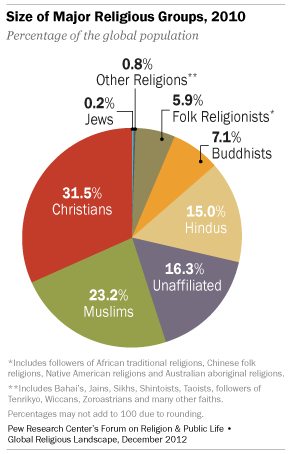Exploring World Religions: A Path to Personal Spiritual Growth
With the world’s incredible diversity of cultures, languages, and faiths, what is your knowledge of other religions? How can a deeper understanding of others help your spiritual path, regardless of your personal belief system or religious affiliation?
Worldwide, over 80% of people identify with a religious group. According to a comprehensive demographic study conducted by the Pew Research Center’s Forum on Religion & Public Life in more than 230 countries and territories, there are an estimated 5.8 billion religiously affiliated adults and children worldwide, representing 84% of the world population in 2010, which was 6.9 billion.
 According to the study, which analyzed over 2,500 censuses, surveys, and population registers, there were approximately 2.2 billion Christians (32% of the world’s population), 1.6 billion Muslims (23%), 1 billion Hindus (15%), nearly 500 million Buddhists (7%), and 14 million Jews (0.2%) worldwide. The study also revealed that approximately one out of every six people worldwide (1.1 billion, or 16%) do not have a religious affiliation. This makes the unaffiliated the third-largest religious group globally, following Christians and Muslims, and roughly equal in size to the world’s Catholic population. Surveys indicate that many of the unaffiliated maintain some religious or spiritual beliefs (like belief in God or a universal spirit) even though they do not associate with a specific faith.
According to the study, which analyzed over 2,500 censuses, surveys, and population registers, there were approximately 2.2 billion Christians (32% of the world’s population), 1.6 billion Muslims (23%), 1 billion Hindus (15%), nearly 500 million Buddhists (7%), and 14 million Jews (0.2%) worldwide. The study also revealed that approximately one out of every six people worldwide (1.1 billion, or 16%) do not have a religious affiliation. This makes the unaffiliated the third-largest religious group globally, following Christians and Muslims, and roughly equal in size to the world’s Catholic population. Surveys indicate that many of the unaffiliated maintain some religious or spiritual beliefs (like belief in God or a universal spirit) even though they do not associate with a specific faith.
The most profound meaning in studying world religions arises from unlocking insights into the diverse frameworks for meaning, morality, spirituality, and personal identity that help actualize the lives of billions. From the earliest religious ideas dating back several hundred thousand years, religion has served as the foundation of empires and civilizations — forming the intent and inspiration of art, architecture, and music and answering our most fundamental questions in the search of the meaning of life.
A Bridge to Tolerance and Understanding
One of the most immediate benefits of studying world religions is cultivating tolerance and appreciation. Cultivating religious empathy and interreligious understanding becomes a primary tool for peaceful coexistence in an increasingly polarized world divided by perceived religious differences. Examining the core beliefs of the various religions and their practices and histories can dispel stereotypes and prejudices, promoting a feeling of human solidarity.
As individuals educate themselves on the ideologies and customs of others, they can begin to appreciate the common denominators found in many religions—compassion and love, forgiveness and worship, and connections to the spiritual realm. Once these foundations of faith are understood and appreciated, bridges of understanding can be built, resulting in a more open and understanding society.
Enhancing Personal Spiritual Growth
While some fiercely insist that learning about world religion threatens their own religion, an open-minded awareness of it can spur personal spiritual development for adherents of any faith (or those with none). For those who study world religions, becoming familiar with the different belief systems of the world presents an opportunity for a new look at their own religious heritage. With a basic understanding of the religions and philosophies of the world, we can better appreciate what’s unique about our own beliefs while also recognizing where it connects with other religions.
As individuals seek to respond to the various needs and concerns of the human condition in the world, they may discover universal truths that facilitate their living of a spiritual life. Many religious traditions share core elements essential to spiritual well-being and development, such as an emphasis on love, compassion, and inner peace. One potential avenue for greater openness is for people to focus on those core elements and integrate them into the spiritual life they are already leading.
Empathy is an essential part of personal spiritual growth. If people understand how it feels to be part of other faith traditions, they learn to respect those of different faiths and more compassionately engage with the non-religious.
Whether you meditate as a Buddhist, practice mindfulness as a Taoist, pray as a Christian, seek divinity as a Hindu, or serve fellow men and women as a Muslim, each religion can contribute its rich spiritual tradition to an Asian’s spiritual toolkit.
Deepening the Search for Truth
The study of world religions might, after all, be a way to deepen the search for the true, the beautiful, and the good, as perspectives on being, God, and human destiny challenge and enrich our own spiritual inquiries.
Strengthening Values
Learning about the moral values taught by various religions can help people enhance the moral values of their own lives while improving their own spiritual self. Listening to the values and morals that religious people preach can help people improve their personal morality.
Promoting Interfaith Dialogue
Conversations with people of other faiths can be deeply enriching. Meeting people of deep faiths calls the imperfect believer to articulate his beliefs to himself and to others and to defend them in the fear of falsehood. These dialogues often give renewed clarity and sensitivity to sacred beliefs while fostering understanding, tolerance, and cross-religious friendship.
Cultivating Inner Peace
Personal spiritual growth most often relates to developing inner peace and contentment. This can be found in the teachings of different religions, mindfulness practices, meditation techniques, and ways to cope with stress.
A Harmonious World Through Religious Awareness
With our world population becoming more diverse and more people in closer proximity to individuals of various religious backgrounds, learning about world religions is not only an academic endeavor but also a way to grow spiritually as an individual and contribute to global peace. Religious awareness can:
Promote Respect for Diversity: Encourage people to honor and celebrate diversity, acknowledging that human differences in belief and faith are natural and normal rather than fearful or threatening.
Promote Inter-faith Dialogue: Without constraining the options open to interfaith associations and their activities, facilitate discussion that brings together genuine followers of different faiths with a view to mutual respect and agreement on the value of working together to communicate, overcome prejudice and misunderstanding, address issues of shared social and ethical concern, and contribute positively to society and the world.
Fight Religious Intolerance: Arm yourself against religious intolerance and extremism. Studies show that education about different religions reduces prejudice and discriminatory behavior.
Increase Amity Among People of Different Religions: Promote peaceful coexistence between communities of different faiths by encouraging tolerance and mutual understanding, thereby reducing the risks of conflict over religious differences.
Bridging Diverse Cultures: It leads to an enhanced respect for the causes and consequences of different cultures and their significance to human civilization, and religion is often central to the formation and development of cultures and societies.
Considering world religions in this context is a tool of the scholarly trade and a personal path toward spiritual enrichment and world peace. Religious diversity is a reality of the cultural landscape, no matter what one’s position is with respect to religion: either as a devout adherent to one religion or another or as a self-defined, secular ‘spiritual but not religious’ individual. During the past several decades, interest in cross-religious understanding and curiosity about the distinctive teachings of world religions has steadily grown.
It is not part of the spiritual path to cease to identify oneself as a Buddhist, Shintoist, Hindu, or a follower of (name your preferred religious tradition here) – or to become one of the other mentioned (name your preferred spiritual tradition here!). Instead, it is to shine our light ever brighter, enriching our textures and expanding our boundaries to contribute to the greater beauty of the world tapestry. Religious awareness means broadening our horizons, not to get outsiders to join in, but to promote a broader and kinder world around us.
EDITOR’S NOTE: A new Pew Research Center survey finds that 80% of U.S. adults say religion’s role in American life is shrinking – a percentage that’s as high as it’s ever been in our surveys. We’ll cover this topic in an upcoming post.






The Editors August 27, 2024
Studying world religions can help to foster tolerance and appreciation. Developing religious empathy and understanding between different faiths is essential for peaceful coexistence in a world becoming more divided due to perceived religious differences.